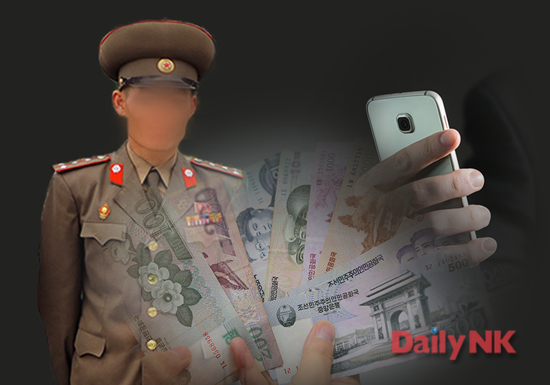
The use of mobile phones by soldiers to conduct business is becoming widespread. Although the use of mobile phones in the army is strictly forbidden, they can be used by registering them under other people’s names.
The practice is particularly common amongst soldiers who are assigned to guard Pyongyang. Once the privilege of children of cadres and the donjuLiterally "masters of money," donju refers to people who hav... More (newly-affluent middle class), the use of phones registered under another name is becoming a valuable asset for the conduct of business, albeit completely illegal.
“Soldiers and officers cannot use mobile phones while on duty, but it has become common practice for the parents of soldiers to send them mobile phones registered under other people’s names. Soldiers in Pyongyang (where the headquarters of the Workers’ Party is located) also sometimes ask their parents to send money so that they can purchase the phones,” a source in South Pyongan Province recently told Daily NK .
“The practice has been rapidly spreading from the border regions and Pyongyang, where soldiers can earn good money. Their parents or business partners usually cover the bills.”
In North Korea, all residents must go through an approval procedure set by the Ministry of State Security [MSS] and the Ministry of People’s Security [MPS] in order to register a mobile phone. The process used to take about a month, but the authorities have simplified the procedure to boost phone sales. Residents can now immediately purchase phones if they present their identification card.
However, enlisted soldiers are banned from using phones. This has created a niche market for identification cards, usually provided by poorer citizens, that can be used to register a phone with the help of intermediaries.
“Brokers borrow ID cards from poorer residents in exchange for 10 kg of rice and purchase the phones using the cards. Then they sell the phones to soldiers at inflated prices,” a source in Pyongyang added.
“Soldiers stationed with Pyongyang construction units can purchase the phones directly using the money they earn through business. Because they need ID cards to buy the phones, they often do deals with local residents and sometimes go into business with them.”
After acquiring a phone, soldiers can make money by ordering products from other regions to be shipped in by train. Some soldiers even earn commissions from other soldiers by helping them send remittances to their parents by phone.
“The soldiers in inland areas have become accustomed to market trading and border guard soldiers are starting businesses to prepare for their livelihoods after discharge,” the Pyyosource said.
These trends indicate that discipline among the soldiers of the People’s Army is weakening. Daily NK previously reported a case in which a begrudging soldier attempted to desert in order to get his superior punished.
As living conditions for the soldiers continue to decline, younger people are increasingly dreading military service. The ‘market generation’ who are actively trading in the markets, largely wish to avoid the army.
“The soldiers that are being enlisted these days were born in the 1990s and have been making their living through market activities. These kids are obsessing over money in the army as well,” said a separate source in South Pyongan Province.
“In addition, high-ranking officials prefer to take a cut of the profits from soldiers who do business rather than restrain them. As a result, there have been many cases in which soldiers have attempted desertion or fought with each other over money issues.”




















